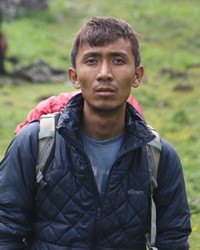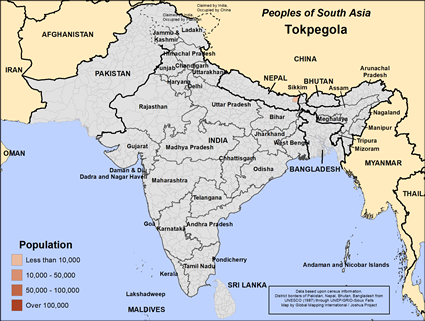Tokpegola in Nepal

Photo Source:
Anonymous
|

Map Source:
People Group data: Omid. Map geography: UNESCO / GMI. Map Design: Joshua Project
|
| People Name: | Tokpegola |
| Country: | Nepal |
| 10/40 Window: | Yes |
| Population: | 1,600 |
| World Population: | 1,600 |
| Primary Language: | Sherpa |
| Primary Religion: | Buddhism |
| Christian Adherents: | 0.00 % |
| Evangelicals: | 0.00 % |
| Scripture: | New Testament |
| Ministry Resources: | Yes |
| Jesus Film: | Yes |
| Audio Recordings: | Yes |
| People Cluster: | South Asia Buddhist |
| Affinity Bloc: | South Asian Peoples |
| Progress Level: |
|
Introduction / History
The Tokpegola are a Sherpa group speaking the Sherpa language. There are only 17 Tokpegola households living in a remote part of Nepal often visited by tourists.
What Are Their Lives Like?
The Tokpegola people are subsistence farmers who grow potatoes, carrots, lentils and grain. Living in such a remote area means they must be self-sustained. That means that not only food but also medical needs must be taken care of on a local basis.
Every year they have a Yak Festival that is intended to attract tourists. There are cultural performances, volleyball tournaments and running events.
What Are Their Beliefs?
The Tokpegola people practice Tibetan Buddhism, the major world religion based on the teachings of Siddhartha Gautama or the Buddha, who lived in the 6th and 5th century BC in ancient India. The Buddha taught the Four Noble Truths by which one can gain spiritual knowledge and escape the endless cycles of reincarnation. Theravada, one of the two major branches of Buddhism, declares that by following the Noble Eightfold Path of right intentions and right actions that a Buddhist can achieve nirvana or a state of freedom and salvation. Mahayana Buddhism, the other main branch of Buddhism, asserts that by following the six perfections that a Buddhist can move along the path to Enlightenment. Tibetan Buddhism falls within the Mahayana school, although it also incorporates many shamanistic practices.
To most Buddhists, however, these things have far less meaning than their traditional beliefs, which are usually animistic. In animism, evil spirits must be appeased through prayers, sacrifices and rituals. Buddhism allows people to mix Buddhist teachings with traditional religion.
Two of the important Buddhist yearly holidays are Vesak, the Buddha's birthday celebrated in May or June and Bodhi Day, the holiday which commemorates the day that the historical Buddha experienced enlightenment under a Bodhi tree.
What Are Their Needs?
They need to develop their tourist industry; this will improve their economy. That requires reliable electricity and medical care. Tourists will need a good way to get there; roads must be well maintained.
Prayer Points
Pray that the tourist industry will provide opportunities for the Tokpegola people opportunities to hear about Lord Jesus and what he can do for their families and communities.
Pray for Tokpegola elders and family leaders to respond to the gospel, opening the way for others to do the same.
Pray for Tokpegola disciples to make more disciples.